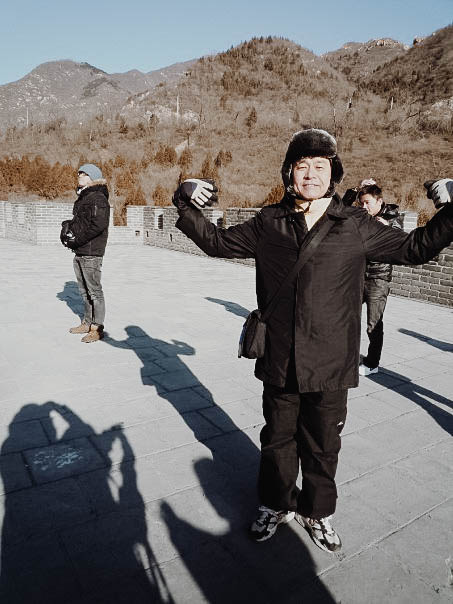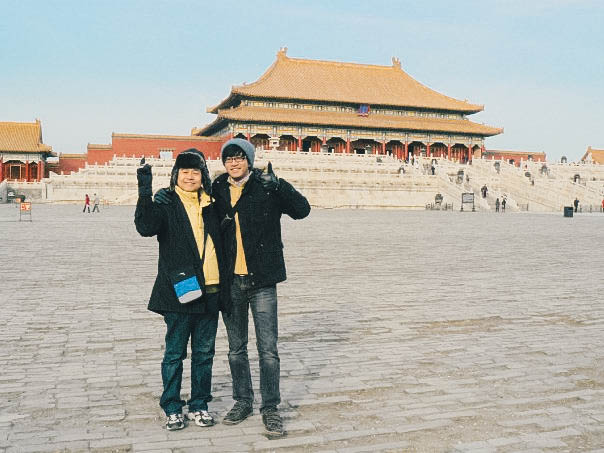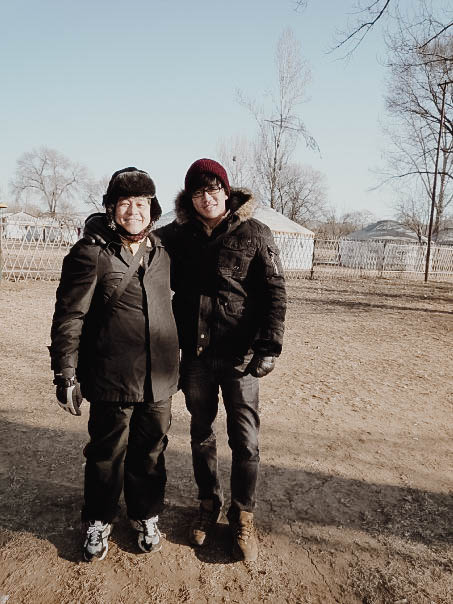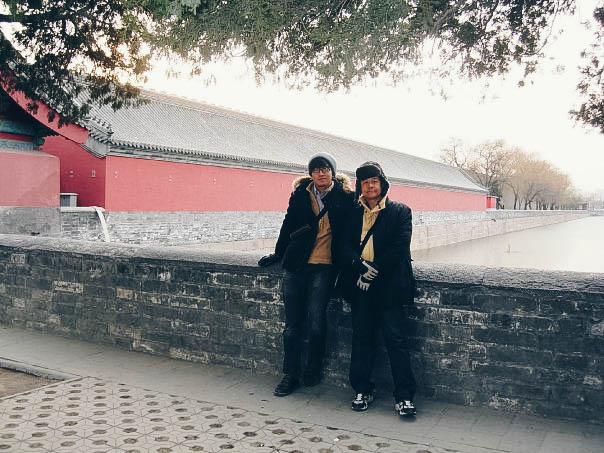I remember climbing the Great Wall of China with my father in 2009. My sisters and mother were predictably not game enough to ascend the cobbled steps, but we men were always so brave.
I led the way up steep stones and cold rock, and reached a silent, open space upon the wall that sheered off into the northern mountains. I was alone, still some distance ahead of Dad.
It was cold and beautiful, and I thought of God. I hummed a simple worship tune I had made up on the spot in response to the masterpiece which lay before me. Then I cut off the quiet song in my throat as Dad made it to where I was, flashing that familiar smile which hid his pride at making it to the top.
I took my gloves off for a picture, and put them on a parapet. The wind knocked them off the wall; Dad laughed, all at the expense of my near-frostbite. We shared some hot tea in the blustery wind, and then we came back down.

I was studying in church later that year when Mum called me on my handphone, and passed the phone to Dad. He told me the doctors said the cancer had gotten worse.
We’d “fight it” together, I told him. We men were always so brave, but those words would ring hollow.
When I got home I remember giving Dad my bank book — with all of $400 in it — to help with the chemotherapy costs. I remember how he smiled with pride, and sadness.
I remember carrying Dad around the house over the next few years, by then all skin and bones. I watched him let go of his dignity and lose his grip on life, while I began to bear a growing anger with God.
I remember praying and crying at night, no longer begging God for healing. I was begging God to let me take my father’s place and pain.
I remember my rage when others told me of miracles of gold dust sprinkled on their hands after prayer – while my faithful father lay ravaged by disease, no miracle imminent. Consumed with anger, I berated God for not choosing to do anything.
I remember Dad’s last words to me — “See you, son” — as I closed the door to his hospital ward.

I remember the way Dad’s breathing began to sound like a shaking rattle later that night.
And I remember the nurses and doctor who rushed over when the laboured breaths stopped coming. It was surreal how the doctor shook his head and said “I’m sorry”.
Suddenly, I was both spectator and participant to some tragic drama—caught up in a new horrific reality that could not have been happening. In my bitter heart, I saw God only as a spectator in the scene.
I remember that I had to look away. I turned to the night sky, which stretched black beyond the cold hospital window grilles, whispering “no, no, no”.
I remember crying, and wishing my tears were a warm rain that would wash this scene and bad dream away. My sisters hugged my mother, as an uncle held me by my shoulder.
I remember how on some nights after that wretched one, I’d think about joining Dad in the afterlife. See you.
But every parapet I inched towards seemed a pale reflection of that beautiful day upon the Great Wall. I knew I’d never make it to Dad if I chose to reach him that way. I had my promises to keep, family to love and take care of, and friends not to disappoint.
And somewhere, deep down, I knew God still existed even if I had denied and cursed Him.
That’s the thing: I remember all these events in my life, and I remember the way they made me feel. But faith isn’t a feeling. Even though I denied it at the time — faithless — God was faithful and with me every step of the way.
“If we are faithless, he remains faithful— for he cannot deny himself.”
(2 Timothy 2.13)
God is sovereign over our lives, which means He is present at all times – even present in our pain. I came to understand how He extended grace to me, even in my rebellion. In all the time I hated Him, God still graciously worked his kindness to me.
For instance, after my Dad passed on, my superiors in the army arranged for me to be sent to the Air Force instead. Their decision meant I could work 9-to-5, which meant I could be at home most days, as my family worked through the aftermath.
This was undeserved grace, despite my open hostility towards God.
In rebellion, as I turned to the wrong girls, the wrong places, the cigarettes and drinks, He brought me home each time. He brought my family through tragedy. He lavished abundance and grace upon us all. We never had to worry about money, and grandchildren soon came to replace grief with joy.
I am comforted by 2 Timothy 2:11-13, because God promises life after death — it is from a hope such as this that we may better endure our trials.
God could well have chosen to deny me when I denied Him. Yet each time I swore Him off, He came back for me. Grace.

As the years passed and I reflected, my heart was softened towards repentance. I see now that even though Dad had gone, I always had a Father.
When I contemplated His ongoing care and goodness in the years of my rebellion, I developed a faith conviction of God as constant and constantly good.
We worship a God who is unchanging in storms. His sovereignty — if at times devastating to experience or difficult to submit to — is simply what it is.
God is God. He was real in the worst of times, and He is real in the best of times. He just is.
“Every good gift and every perfect gift is from above, coming down from the Father of lights with whom there is no variation or shadow due to change.” (James 1:17)

I’ve felt in recent years that God was turning a page with my story. Indeed, after hard times in life, it’s tempting to believe that good things would begin happening to me. I felt like I was due some good.
Yet all I truly deserve is death.
And somehow, still, despite this, even while I was a sinner, God chose to give me good things in gracious abundance. But this is nothing compared to what God has done for all humanity in Romans 5.8.
Through Jesus Christ, God has given me the gift of eternal life: a promise that I will walk on Greater Walls with Dad again, someday in paradise.









